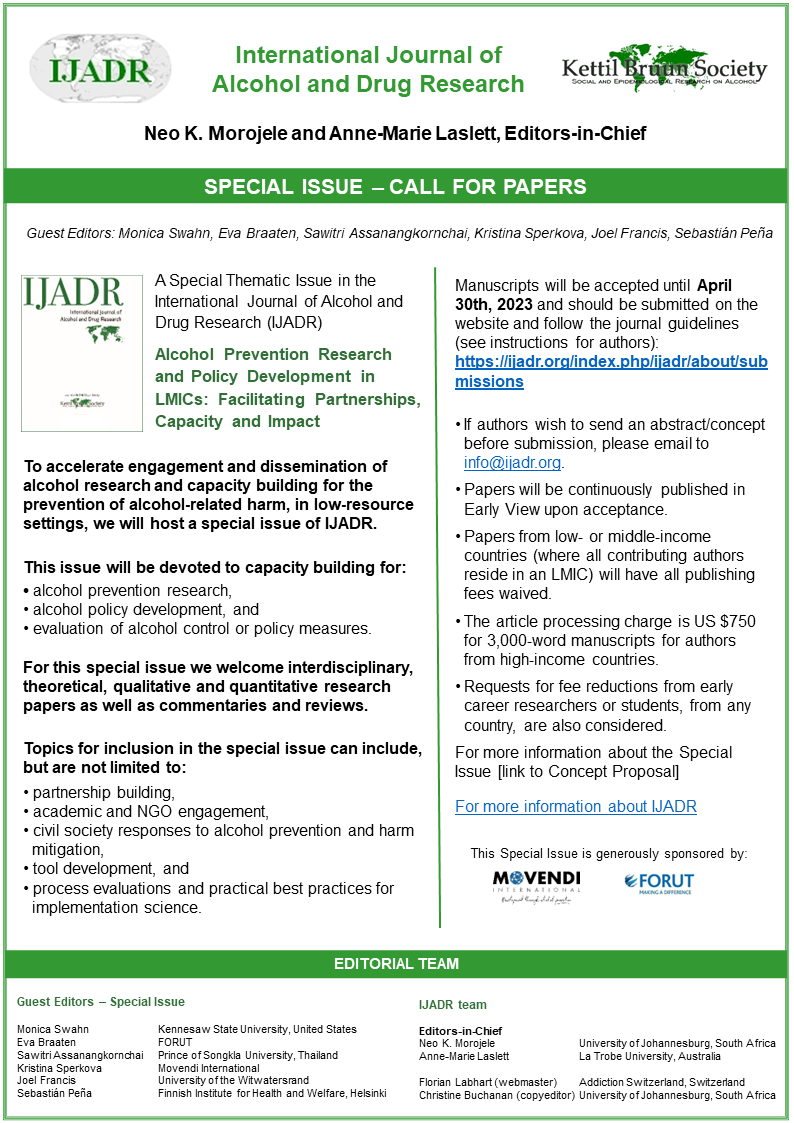Alcohol Prevention Research and Policy Development in LMICs: Facilitating Partnerships, Capacity and Impact
Guest Editors: Monica Swahn, Eva Braaten, Sawitri Assanangkornchai, Kristina Sperkova, Joel Francis, Sebastián Peña
The four key aims of the IJADR are to:
- publish high quality, peer reviewed articles addressing substance use and substance-related problems, as well as addictive behaviours generally, from an international perspective,
- increase international knowledge and understanding about substance use and substance-related problems by providing mentoring and other assistance to research colleagues in countries where there are fewer resources and less infrastructure and traditional support of research on alcohol and drugs,
- promote involvement of early career researchers and researchers from less resourced countries in all aspects of the journal operations, and
- provide an open access online journal accessible to the research community, educators, policy makers and others interested in the area of substance use and substance-related issues.
To accelerate engagement and dissemination of alcohol research and capacity building for the prevention of alcohol-related harm, in low-resource settings, we will host a special issue of IJADR. This issue will be devoted to capacity building for:
- alcohol prevention research,
- alcohol policy development,
- evaluation of alcohol control or policy measures.
For this special issue we welcome interdisciplinary, theoretical, qualitative and quantitative research papers as well as commentaries and reviews. By reviews we mean literature reviews, policy reviews or potentially commentaries or reviews of evidence or policy.
Topics for inclusion in the special issue can include, but are not limited to:
- partnership building,
- academic and NGO engagement,
- civil society responses to alcohol prevention and harm mitigation,
- tool development,
- process evaluations and practical best practices for implementation science.
However, the key focus of the manuscript submissions needs to be centered in a low- or middle-income country or countries (LMICs) and focus on facilitating partnerships, research, capacity building and impact. Typical empirical research papers are also welcome but need to have clear implication for low-resource settings and capacity building and practical impact or relevance.
A submission can cover one or more countries and/or make a comparative analysis regarding best practices including the WHO SAFER initiative. The submission may focus on specific population groups, health systems, policies or countries and may, if applicable, measure different health outcomes, health economics/cost data or other features of alcohol research or evaluations. Manuscripts that focus on the process of capacity building for research, advocacy or policy development are also of interest and could focus on lessons learned, strategic planning, and those factors that hindered or enabled successful outcomes including industry influences.
Manuscript will be accepted until April 30th, 2023 and should be submitted on the website and follow the journal guidelines (see instructions for authors): https://ijadr.org/index.php/ijadr/about/submissions
Papers will be published in Early View continuously upon acceptance.
Papers from low- or middle-income countries (where all contributing authors reside in an LMIC) will have all publishing fees waived (as is always the case at IJADR). The article processing charge is otherwise US$750 for 3,000-word manuscripts for authors from high-income countries. Requests for fee reductions from early career researchers or students, from any country, are also considered.
We only welcome manuscripts that have not been published previously and that are not under consideration for publication in another journal. For any manuscripts including human subjects ethical approval date needs to be specified along with a statement that clearance has been received.
We also expect that at least one of the authors of the manuscript has an affiliation in an LMIC.
We anticipate publishing 12-20 papers in the thematic issue.
Key words for this special issue include alcohol, alcohol harm, alcohol prevention, capacity building, research agenda, alcohol environment, alcohol policy, alcohol control, alcohol harm, alcohol problems, low- and middle-income countries or settings, alcohol pricing, marketing or availability.
Visit Journal website

